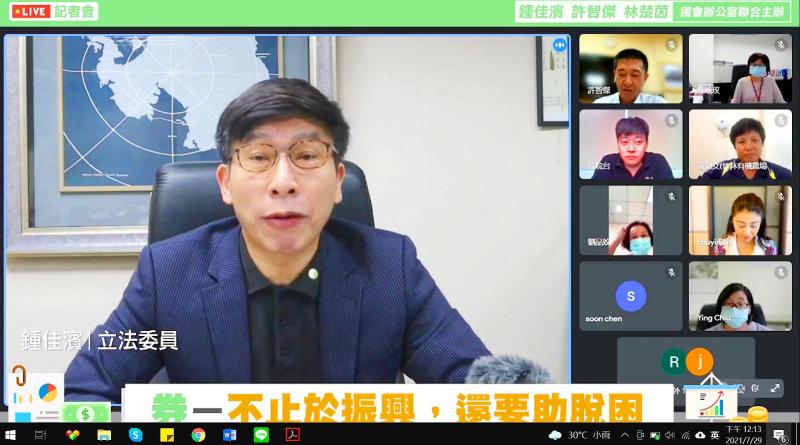The Executive Yuan should prepare digital stimulus vouchers and earmark funding for a stimulus program that should start once the COVID-19 situation has eased, Democratic Progressive Party (DPP) legislators told an online news conference yesterday.
DPP Legislator Chung Chia-pin (鍾佳濱) said that issuing vouchers would be an effective means for the government to stimulate a post-COVID-19 economic recovery.
“Digital vouchers” of small denominations should be issued rather than paper ones, as they would make it easier for smaller businesses to handle payments, he said.

Photo: Chien Hui-ju, Taipei Times
The program should target the needs of the food and beverage sector, retailers, firms in the travel industry, and the arts and humanities sector, he said.
The program should seek to help small businesses affected by the outbreak and incentivize smaller purchases instead of big-ticket spending, he said.
Contactless payments using digital vouchers would be more convenient than paper vouchers and help lower the risk of COVID-19 infection, DPP Legislator Lin Chu-yin (林楚茵) said.
Last year’s Triple Stimulus Voucher program cost the government NT$1 billion (US$35.8 million), including packaging, delivery and printing, she said, adding that digital vouchers lower the share of spending that does not benefit the public.
The Act Governing Electronic Payment Institutions (電子支付機構管理條例) sets safe standards for the easy flow of digital payments, and the government should recognize the role e-payment platforms have taken on for many Taiwanese, she said.
Digital vouchers would also push the development of a “green” financial system and the local fintech industry, she said.
Stimulus programs should start only when the COVID-19 situation has eased, DPP Legislator Hsu Chih-chieh (許智傑) said, adding that the scope and aims of a program should be debated by the Executive Yuan.
Hsu said he believed that more people would opt for digital vouchers this time, compared with just 13 percent when the Triple Stimulus Vouchers were issued.
The National Development Council said that it would look into the matter.

A decision to describe a Chinese Ministry of Foreign Affairs statement on Singapore’s Taiwan policy as “erroneous” was made because the city-state has its own “one China policy” and has not followed Beijing’s “one China principle,” Deputy Minister of Foreign Affairs Tien Chung-kwang (田中光) said yesterday. It has been a longstanding practice for the People’s Republic of China (PRC) to speak on other countries’ behalf concerning Taiwan, Tien said. The latest example was a statement issued by the PRC after a meeting between Singaporean Prime Minister Lawrence Wong (黃循財) and Chinese President Xi Jinping (習近平) on the sidelines of the APEC summit

Taiwan’s passport ranked 34th in the world, with access to 141 visa-free destinations, according to the latest update to the Henley Passport Index released today. The index put together by Henley & Partners ranks 199 passports globally based on the number of destinations holders can access without a visa out of 227, and is updated monthly. The 141 visa-free destinations for Taiwanese passport holders are a slight decrease from last year, when holders had access to 145 destinations. Botswana and Columbia are among the countries that have recently ended visa-free status for Taiwanese after “bowing to pressure from the Chinese government,” the Ministry

‘SIGN OF DANGER’: Beijing has never directly named Taiwanese leaders before, so China is saying that its actions are aimed at the DPP, a foundation official said National Security Bureau (NSB) Director-General Tsai Ming-yen (蔡明彥) yesterday accused Beijing of spreading propaganda, saying that Chinese President Xi Jinping (習近平) had singled out President William Lai (賴清德) in his meeting with US President Joe Biden when talking about those whose “true nature” seek Taiwanese independence. The Biden-Xi meeting took place on the sidelines of the APEC summit in Peru on Saturday. “If the US cares about maintaining peace across the Taiwan Strait, it is crucial that it sees clearly the true nature of Lai and the ruling Democratic Progressive Party (DPP) in seeking Taiwanese independence, handles the Taiwan question with extra

HEALTHCARE: Following a 2022 Constitutional Court ruling, Taiwanese traveling overseas for six months would no longer be able to suspend their insurance Measures allowing people to suspend National Health Insurance (NHI) services if they plan to leave the country for six months would be abolished starting Dec. 23, NHIA Director-General Shih Chung-liang (石崇良) said yesterday. The decision followed the Constitutional Court’s ruling in 2022 that the regulation was unconstitutional and that it would invalidate the regulation automatically unless the NHIA amended it to conform with the Constitution. The agency would amend the regulations to remove the articles and sections that allow the suspension of NHI services, and also introduce provisional clauses for those who suspended their NHI services before Dec. 23, Shih said. According to